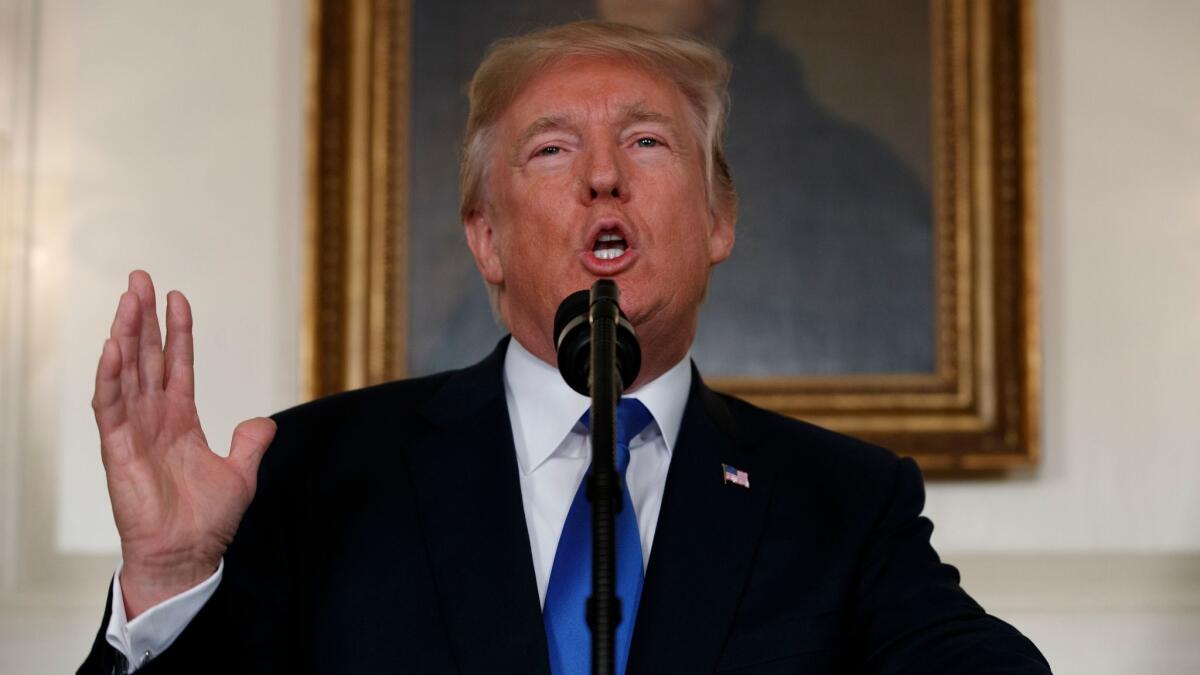Editorial: Trump is inching closer to blowing up the Iran nuclear deal

- Share via
As a candidate for president, Donald Trump denounced the international agreement that placed important limits on Iran’s nuclear program as “the worst deal ever negotiated.” Never mind that his opposition seemed based more on the fact that the agreement was one of the crowning achievements of the Obama administration than on any deficiencies in the deal itself.
Yet since Trump’s inauguration, his wiser foreign-policy advisors have striven to keep him from wrecking the agreement. That’s because they know that Iran generally has complied with its terms, making the region a safer place, and that a U.S. repudiation of the deal would estrange this country from its closest allies. Last year Trump declined to certify that Iran’s level of compliance with the agreement benefited “U.S. national security interests,” but he was persuaded not to undo the agreement.
On Friday, however, the president took what may be an irreversible step toward that catastrophic result. He again waived for 120 days economic sanctions that the U.S. agreed to lift as part of the nuclear agreement. But at the same time Trump warned that he wouldn’t do so again unless there was an agreement with America’s European allies to fix the deal’s “terrible flaws.”
“Terrible flaws” is an exaggeration of Trumpian proportions. The 2015 deal between Iran and the so-called P5+1 – the five permanent members of the U.N. Security Council and Germany — is imperfect. A major problem is that many of its limitations on Iran’s nuclear activities expire after 10 or 15 years. Negotiations to extend the life of those provisions are worth pursuing. So are international efforts to place restrictions on Iran’s testing of ballistic missiles potentially capable of carrying nuclear warheads.
But America’s European allies are unlikely to help pursue such agreements if Trump hurls ultimatums at them or threatens to abrogate the current agreement. The day before Trump’s statement, the foreign ministers of Germany, France, Britain and the European Union urged the U.S. not to withdraw from the deal.
It’s also doubtful that those allies would accept Trump’s position that Iran should be excluded from negotiations on a further agreement. Yet that is what Trump is proposing. A senior administration official told reporters that a newer agreement “would not entail direct negotiations with the Iranians; this would be something the United States works out with our European partners only.”
Trump also suggested a second path to “fixing” flaws in the current agreement: legislation in Congress that would dictate terms to Iran to guarantee that it would never develop nuclear weapons. If it didn’t comply, U.S. sanctions would be imposed. This ignores the fact that it was coordinated international sanctions that paved the way for the 2015 agreement.
Finally, Trump issued a call for U.S. allies to confront Iran’s other “malign activities” — including its support for terrorist groups — and to “pressure the Iranian regime to stop violating its citizens’ rights.” But establishing a united front on these priorities will be vastly more difficult if the U.S. goes it alone on the nuclear agreement.
Follow the Opinion section on Twitter @latimesopinion and Facebook
More to Read
A cure for the common opinion
Get thought-provoking perspectives with our weekly newsletter.
You may occasionally receive promotional content from the Los Angeles Times.









